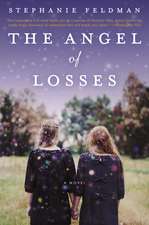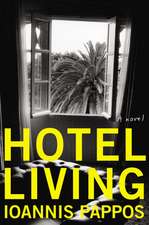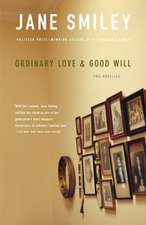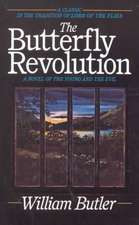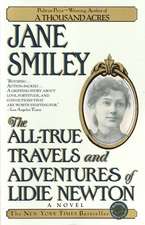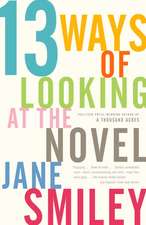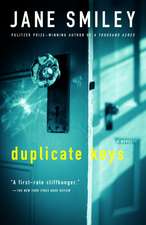Horse Heaven: Ballantine Reader's Circle
Autor Jane Smileyen Limba Engleză Paperback – 31 ian 2001
Vezi toate premiile Carte premiată
"A WISE, SPIRITED NOVEL . . . [IN WHICH] SMILEY PLUMBS THE WONDROUSLY
STRANGE WORLD OF HORSE RACING." --People
"ONE OF THE PREMIER NOVELISTS OF HER GENERATION, possessed of a mastery
of craft and an uncompromising vision that grow more powerful with each
book . . . Racing's eclectic mix of classes and personalities provides
Smiley with fertile soil . . . Expertly juggling storylines, she
investigates the sexual, social, psychological, and spiritual problems
of wealthy owners, working-class bettors, trainers on the edge of
financial ruin, and, in a typically bold move, horses."
--The Washington Post
"A NOVEL OF PASSION IN EVERY SENSE . . . [SHE DOES] IT ALL WITH APLOMB .
. . WITH A DEMON NARRATIVE INTELLIGENCE."
--The Boston Sunday Globe
"WITTY, ENERGETIC . . . It's deeply satisfying to read a work of fiction
so informed about its subject and so alive to every nuance and detail .
. . [Smiley's] final chapters have a wonderful restorative quality."
--The New York Times Book Review
"RICHLY DETAILED, INGENIOUSLY CONSTRUCTED . . . YOU WILL REVEL IN JANE
SMILEY'S HORSE HEAVEN."
--San Diego Union-Tribune
Chosen by the Los Angeles Times as One of the Best Books of the Year
Din seria Ballantine Reader's Circle
-
 Preț: 97.74 lei
Preț: 97.74 lei -
 Preț: 120.15 lei
Preț: 120.15 lei -
 Preț: 107.27 lei
Preț: 107.27 lei -
 Preț: 121.12 lei
Preț: 121.12 lei -
 Preț: 113.15 lei
Preț: 113.15 lei -
 Preț: 115.32 lei
Preț: 115.32 lei -
 Preț: 98.56 lei
Preț: 98.56 lei -
 Preț: 99.83 lei
Preț: 99.83 lei -
 Preț: 129.37 lei
Preț: 129.37 lei -
 Preț: 114.71 lei
Preț: 114.71 lei -
 Preț: 65.81 lei
Preț: 65.81 lei -
 Preț: 116.57 lei
Preț: 116.57 lei -
 Preț: 91.96 lei
Preț: 91.96 lei -
 Preț: 90.35 lei
Preț: 90.35 lei -
 Preț: 120.71 lei
Preț: 120.71 lei -
 Preț: 116.64 lei
Preț: 116.64 lei -
 Preț: 139.70 lei
Preț: 139.70 lei -
 Preț: 110.76 lei
Preț: 110.76 lei -
 Preț: 127.70 lei
Preț: 127.70 lei -
 Preț: 116.55 lei
Preț: 116.55 lei -
 Preț: 112.52 lei
Preț: 112.52 lei -
 Preț: 109.71 lei
Preț: 109.71 lei -
 Preț: 111.51 lei
Preț: 111.51 lei -
 Preț: 111.17 lei
Preț: 111.17 lei -
 Preț: 121.22 lei
Preț: 121.22 lei -
 Preț: 104.66 lei
Preț: 104.66 lei -
 Preț: 106.23 lei
Preț: 106.23 lei -
 Preț: 123.90 lei
Preț: 123.90 lei -
 Preț: 118.73 lei
Preț: 118.73 lei -
 Preț: 126.88 lei
Preț: 126.88 lei -
 Preț: 112.64 lei
Preț: 112.64 lei -
 Preț: 110.96 lei
Preț: 110.96 lei -
 Preț: 128.86 lei
Preț: 128.86 lei -
 Preț: 124.72 lei
Preț: 124.72 lei -
 Preț: 128.86 lei
Preț: 128.86 lei -
 Preț: 122.76 lei
Preț: 122.76 lei -
 Preț: 122.64 lei
Preț: 122.64 lei -
 Preț: 133.06 lei
Preț: 133.06 lei -
 Preț: 132.06 lei
Preț: 132.06 lei -
 Preț: 109.73 lei
Preț: 109.73 lei -
 Preț: 93.82 lei
Preț: 93.82 lei -
 Preț: 101.06 lei
Preț: 101.06 lei -
 Preț: 85.08 lei
Preț: 85.08 lei -
 Preț: 85.13 lei
Preț: 85.13 lei -
 Preț: 79.16 lei
Preț: 79.16 lei -
 Preț: 88.39 lei
Preț: 88.39 lei -
 Preț: 99.83 lei
Preț: 99.83 lei -
 Preț: 92.83 lei
Preț: 92.83 lei -
 Preț: 87.43 lei
Preț: 87.43 lei
Preț: 126.98 lei
Nou
Puncte Express: 190
Preț estimativ în valută:
24.30€ • 26.39$ • 20.41£
24.30€ • 26.39$ • 20.41£
Carte disponibilă
Livrare economică 01-15 aprilie
Preluare comenzi: 021 569.72.76
Specificații
ISBN-13: 9780449005415
ISBN-10: 0449005410
Pagini: 592
Dimensiuni: 140 x 208 x 28 mm
Greutate: 0.57 kg
Ediția:Trade Pbk.
Editura: BALLANTINE BOOKS
Seria Ballantine Reader's Circle
Locul publicării:New York, NY
ISBN-10: 0449005410
Pagini: 592
Dimensiuni: 140 x 208 x 28 mm
Greutate: 0.57 kg
Ediția:Trade Pbk.
Editura: BALLANTINE BOOKS
Seria Ballantine Reader's Circle
Locul publicării:New York, NY
Notă biografică
Jane Smiley is the author of nine previous works of fiction, including The Age of Grief, The Greenlanders, Ordinary Love & Good Will, A Thousand Acres (for which she was awarded the Pulitzer Prize), and Moo. She lives in northern California.
From the Hardcover edition.
From the Hardcover edition.
Extras
november 1 / JACK RUSSELL
On the second Sunday morning in November, the day after the Breeders' Cup at Hollywood Park (which he did not get to this year, because the trek to the West Coast seemed a long one from Westchester County and he didn't have a runner, had never had a runner, how could this possibly be his fault, hadn't he spent millions breeding, training, and running horses? Wasn't it time he had a runner in the Breeders' Cup or got out of the game altogether, one or the other?), Alexander P. Maybrick arose from his marriage bed at 6:00 a.m., put on his robe and slippers, and exited the master suite he shared with his wife, Rosalind. On the way to the kitchen, he passed the library, his office that adjoined the library, the weight room, the guest bathroom, the living room, and the dining room. In every room his wife had laid a Persian carpet of exceptional quality—his wife had an eye for quality in all things—and it seemed like every Persian carpet in every room every morning was adorned with tiny dark, dense turds deposited there by Eileen, the Jack Russell terrier. Eileen herself was nestled up in bed with his wife, apparently sleeping, since she didn't raise even her head when Mr. Maybrick arose, but Mr. Maybrick knew she was faking. No Jack Russell sleeps though movement of any kind except as a ruse.
Mr. Maybrick had discussed this issue with Rosalind on many levels. It was not as though he didn't know what a Jack Russell was all about when Rosalind brought the dog home. A Jack Russell was about making noise, killing small animals and dragging their carcasses into the house, attacking much larger dogs, refusing to be house-trained, and in all other ways living a primitive life. Rosalind had promised to start the puppy off properly, with a kennel and a trainer and a strict routine and a book about Jack Russells, and every other thing that worked with golden retrievers and great Danes and mastiffs, and dogs in general. But Eileen wasn't a dog, she was a beast, and the trainer had been able to do only one thing with her, which was stop her from barking. And thank God for that, because if the trainer had not stopped Eileen from barking Mr. Maybrick would have had to strangle her. Rosalind, who sent her underwear to the cleaners and had the windows washed every two weeks and kept the oven spotless enough to sterilize surgical instruments, tried to take the position that the turds were small and harmless, and that the carpets could handle them, but really she just thought the dog was cute, even after Eileen learned to jump from the floor to the kitchen counters, and then walked around on them with her primevally dirty feet, click click click, right in front of Mr. Maybrick, even after Eileen began to sleep under the covers, pushing her wiry, unsoft coat right into Mr. Maybrick's nose in the middle of the night. "Do you know where this dog has been?" Mr. Maybrick would say to Rosalind, and Rosalind would reply, "I don't want to think about that."
Mr. Maybrick was a wealthy and powerful man, and in the end, that was what stopped him. He knew that, in the larger scheme of things, he had been so successful, and, in many ways, so unpleasant about it all (he was a screamer and a bully, tough on everyone), that Eileen had come into his life as a corrective. She weighed one-twentieth of what he did. He could crush her between his two fists. He could also get rid of her, either by yelling at his wife or by sending her off to the SPCA on his own, but he dared not. There was some abyss of megalomania that Eileen guarded the edge of for Mr. Maybrick, and in the mornings, when he walked to the kitchen to get his coffee, he tried to remember that.
The first thing Mr. Maybrick did after he poured his coffee was to call his horse-trainer. When the trainer answered with his usual "Hey, there!," Mr. Maybrick said, "Dick!," and then Dick said, "Oh. Al." He always said it just like that, as if he were expecting something good to happen, and Mr. Maybrick had happened instead. Mr. Maybrick ignored this and sipped his coffee while Dick punched up his response. "Can I do something for you, Al?"
"Yeah. You can put that Laurita filly in the allowance race on Thursday."
"You've got a condition book, then."
"Oh, sure. I want to know what races are being run. You trainers keep everything so dark—"
"Well, sure. Al, listen—"
"Dick, Frank Henderson thinks it's the perfect race for her. A little step up in class, but not too much competi—"
"I'll see."
"I want to do it. Henderson said—"
"Mr. Henderson—"
"Frank Henderson knows horses and racing, right? His filly won the Kentucky Oaks last year, right? He would have had that other horse in the sprint yesterday if it hadn't broken down. Listen to me, Dick. I shouldn't have to beg you." This was more or less a threat, and as he said it, not having actually intended to, Mr. Maybrick reflected upon how true it was. He was the owner. Dick Winterson was the trainer. The relationship was a simple one. Henderson was always telling him not to be intimidated by trainers.
"We'll see." "You always say that. Look, I don't want to watch the Breeders' Cup on TV again next year. Henderson thinks this filly's got class."
"She does, but I want to go slow with her. We have to see how the filly—"
Mr. Maybrick hung up. He didn't slam down the phone—he no longer did that—he simply hung up. If Dick had known him as long as Mr. Maybrick had known himself, he would have realized what a good thing it was, simply hanging up. And here was another thing he could use with his wife. He could say that if he didn't have to pass all those turds in the morning he could start off calmer and his capacity for accepting frustration would last a little longer. It was scientific. When they didn't have the dog, he had gotten practically to the fourth phone call without offending anyone. Now he got maybe to the second. He took another sip of his coffee, and called his broker, then his partner, then his general manager, then his other partner, then his secretary, then his broker again, then his AA sponsor (who was still in bed). This guy's name was Harold W., and he was a proctologist as well as an alcoholic. Mr. Maybrick had chosen him because he was a man of infinite patience and because he knew everything there was to know about prostate glands.
"I want a drink," said Mr. Maybrick. "There's turds all over the house. I bet you can understand that one."
"Good morning, Al. What's really up? You haven't had a drink in two years." "But I'm always on the verge. It's a real struggle with me."
"Say your serenity prayer."
"God—"
"God—" They said the serenity prayer together.
"Look," said Al, "I got this pain in my groin—"
"No freebies. That's the rule. My partner will be happy to—"
"It's like water trickling out of a hose. I can't—"
"You need to be working on your fourth step."
"What's that one again?" "Taking a fearless inventory of your character defects."
"Oh, yeah."
"Trying to get something for nothing is one of your character defects."
"I never pay retail."
"Then you need to work on your third step, Al."
"What's that one?"
"Turning your life over to your higher power."
Mr. Maybrick cleared his throat, as he always did when someone said those higher-power words. Those words always made an image of Ralph Peters come into his head, the guy who used to be head of the Mercantile Exchange in Chicago, and who foiled the Hunt brothers when they tried to corner the silver market back in '80. Peters was an Austrian guy. He had "higher power" written all over him, and he was the last guy Mr. Maybrick had ever feared. He would never turn his life over to Peters.
Harold went on, "Let's think a little more about the last day. What about rage? Have you been raging?"
"Well, sure. A guy in my posi—"
"Should be filled with gratitude. Your position is a gratitude position. Thank you, God, for every frustration, every bad deal, every monetary loss, every balk and obstacle and resistance."
Harold often teased him in this way. Mr. Maybrick felt better for it, because it made him think Harold W. liked him after all, and it reminded him, too, of when his old man had been in a good mood. Joshing him.
"Every non-cooperator, every son of a bitch, every idiot who gets in my way, every slow driver, every—"
"Okay."
"I've got to go to the hospital."
"But I— There's wine in the liquor cabinet."
"Throw it out. I've got to go. The assholes are accumulating."
Mr. Maybrick laughed. Harold W. laughed, too. Harold W. wasn't a saint, by any means. He had been in AA for thirty-two years, at a meeting almost every day. Mr. Maybrick didn't know whether to respect that or have contempt for it, but he knew for a fact that Harold W. was a force to be reckoned with, and he thanked him politely, ragelessly, and hung up the phone.
Now Eileen trotted into the room. It was clear to Mr. Maybrick that the dog was intentionally ignoring him. She clicked over to her bowl and checked it, took a drink from the water dish, circumnavigated the cooking island, and then, casually, leapt onto the granite counter and trotted toward the sink. "Get down, Eileen," said Mr. Maybrick. It was as if he hadn't spoken. Eileen cocked her little tan head and peered into the garbage disposal, noting that the stopper was in place. Her little stump of a tail flicked a couple of times, and she seemed to squat down. She stretched her paw toward the stopper, but her legs were too short; she couldn't reach it. She surveyed the situation for a moment, then went behind the sink, picked up a pinecone that had been hidden there, and jumped down. Only now did she look at Mr. Maybrick. She dropped the pinecone at his slippered feet and backed up three steps, her snapping black gaze boring into his. "I don't want to do that, Eileen," he said. Her strategy was to take little steps backward and forward and then spin in a tight circle, gesturing at the pinecone with her nose. But she never made a sound.
"You're not a retriever, Eileen, you're a terrier. Go outside and kill something."
Indeed, Eileen was a terrier, and with terrier determination, she resolved that Mr. Maybrick would ultimately throw the pinecone. She continued dancing, every few seconds picking up the pinecone and dropping it again. She was getting cuter and cuter. That was her weapon. Mr. Maybrick considered her a very manipulative animal. He looked away from her and took another sip of his (third) cup of coffee. Now she barked once, and when he looked at her, she went up on her hind legs. She had thighs like a wrestler—she seemed to float. Mr. Maybrick had often thought that a horse as athletic as this worthless dog would get into the Kentucky Derby, then the Breeders' Cup, win him ten million dollars on the track, and earn him five million a year in the breeding shed for, say, twenty years. That was $110 million; it had happened to others. He had been racing and breeding horses for eleven years, and it had never happened to him. This was just the sort of thing that made you a little resentful, and rightfully so, whatever Harold W. had to say about gratitude. He closed his eyes when he felt himself sliding that way, beginning to count up the millions he had spent running horses and thinking about deserving. With his eyes closed, Al could hear her drop the pinecone rhythmically on the tile, chock chock chock chock, the bass, her little toenails clicking a tune around it. Didn't he deserve a really big horse? Didn't he? And then, while his eyes were still closed, dog and pinecone arrived suddenly in his lap, a hard, dense little weight but live, electric. With the shock, he nearly dropped his coffee cup, and as it was, spilled on the counter. "God damn it!" he shouted. Eileen jumped down and trotted away. "Hey! Come here, Eileen," he said. "Eileen!" Eileen sheared off into the living room, and he realized that he had forgotten to let her out. Mr. Maybrick put his arms up on the counter and laid his head upon them.
On the second Sunday morning in November, the day after the Breeders' Cup at Hollywood Park (which he did not get to this year, because the trek to the West Coast seemed a long one from Westchester County and he didn't have a runner, had never had a runner, how could this possibly be his fault, hadn't he spent millions breeding, training, and running horses? Wasn't it time he had a runner in the Breeders' Cup or got out of the game altogether, one or the other?), Alexander P. Maybrick arose from his marriage bed at 6:00 a.m., put on his robe and slippers, and exited the master suite he shared with his wife, Rosalind. On the way to the kitchen, he passed the library, his office that adjoined the library, the weight room, the guest bathroom, the living room, and the dining room. In every room his wife had laid a Persian carpet of exceptional quality—his wife had an eye for quality in all things—and it seemed like every Persian carpet in every room every morning was adorned with tiny dark, dense turds deposited there by Eileen, the Jack Russell terrier. Eileen herself was nestled up in bed with his wife, apparently sleeping, since she didn't raise even her head when Mr. Maybrick arose, but Mr. Maybrick knew she was faking. No Jack Russell sleeps though movement of any kind except as a ruse.
Mr. Maybrick had discussed this issue with Rosalind on many levels. It was not as though he didn't know what a Jack Russell was all about when Rosalind brought the dog home. A Jack Russell was about making noise, killing small animals and dragging their carcasses into the house, attacking much larger dogs, refusing to be house-trained, and in all other ways living a primitive life. Rosalind had promised to start the puppy off properly, with a kennel and a trainer and a strict routine and a book about Jack Russells, and every other thing that worked with golden retrievers and great Danes and mastiffs, and dogs in general. But Eileen wasn't a dog, she was a beast, and the trainer had been able to do only one thing with her, which was stop her from barking. And thank God for that, because if the trainer had not stopped Eileen from barking Mr. Maybrick would have had to strangle her. Rosalind, who sent her underwear to the cleaners and had the windows washed every two weeks and kept the oven spotless enough to sterilize surgical instruments, tried to take the position that the turds were small and harmless, and that the carpets could handle them, but really she just thought the dog was cute, even after Eileen learned to jump from the floor to the kitchen counters, and then walked around on them with her primevally dirty feet, click click click, right in front of Mr. Maybrick, even after Eileen began to sleep under the covers, pushing her wiry, unsoft coat right into Mr. Maybrick's nose in the middle of the night. "Do you know where this dog has been?" Mr. Maybrick would say to Rosalind, and Rosalind would reply, "I don't want to think about that."
Mr. Maybrick was a wealthy and powerful man, and in the end, that was what stopped him. He knew that, in the larger scheme of things, he had been so successful, and, in many ways, so unpleasant about it all (he was a screamer and a bully, tough on everyone), that Eileen had come into his life as a corrective. She weighed one-twentieth of what he did. He could crush her between his two fists. He could also get rid of her, either by yelling at his wife or by sending her off to the SPCA on his own, but he dared not. There was some abyss of megalomania that Eileen guarded the edge of for Mr. Maybrick, and in the mornings, when he walked to the kitchen to get his coffee, he tried to remember that.
The first thing Mr. Maybrick did after he poured his coffee was to call his horse-trainer. When the trainer answered with his usual "Hey, there!," Mr. Maybrick said, "Dick!," and then Dick said, "Oh. Al." He always said it just like that, as if he were expecting something good to happen, and Mr. Maybrick had happened instead. Mr. Maybrick ignored this and sipped his coffee while Dick punched up his response. "Can I do something for you, Al?"
"Yeah. You can put that Laurita filly in the allowance race on Thursday."
"You've got a condition book, then."
"Oh, sure. I want to know what races are being run. You trainers keep everything so dark—"
"Well, sure. Al, listen—"
"Dick, Frank Henderson thinks it's the perfect race for her. A little step up in class, but not too much competi—"
"I'll see."
"I want to do it. Henderson said—"
"Mr. Henderson—"
"Frank Henderson knows horses and racing, right? His filly won the Kentucky Oaks last year, right? He would have had that other horse in the sprint yesterday if it hadn't broken down. Listen to me, Dick. I shouldn't have to beg you." This was more or less a threat, and as he said it, not having actually intended to, Mr. Maybrick reflected upon how true it was. He was the owner. Dick Winterson was the trainer. The relationship was a simple one. Henderson was always telling him not to be intimidated by trainers.
"We'll see." "You always say that. Look, I don't want to watch the Breeders' Cup on TV again next year. Henderson thinks this filly's got class."
"She does, but I want to go slow with her. We have to see how the filly—"
Mr. Maybrick hung up. He didn't slam down the phone—he no longer did that—he simply hung up. If Dick had known him as long as Mr. Maybrick had known himself, he would have realized what a good thing it was, simply hanging up. And here was another thing he could use with his wife. He could say that if he didn't have to pass all those turds in the morning he could start off calmer and his capacity for accepting frustration would last a little longer. It was scientific. When they didn't have the dog, he had gotten practically to the fourth phone call without offending anyone. Now he got maybe to the second. He took another sip of his coffee, and called his broker, then his partner, then his general manager, then his other partner, then his secretary, then his broker again, then his AA sponsor (who was still in bed). This guy's name was Harold W., and he was a proctologist as well as an alcoholic. Mr. Maybrick had chosen him because he was a man of infinite patience and because he knew everything there was to know about prostate glands.
"I want a drink," said Mr. Maybrick. "There's turds all over the house. I bet you can understand that one."
"Good morning, Al. What's really up? You haven't had a drink in two years." "But I'm always on the verge. It's a real struggle with me."
"Say your serenity prayer."
"God—"
"God—" They said the serenity prayer together.
"Look," said Al, "I got this pain in my groin—"
"No freebies. That's the rule. My partner will be happy to—"
"It's like water trickling out of a hose. I can't—"
"You need to be working on your fourth step."
"What's that one again?" "Taking a fearless inventory of your character defects."
"Oh, yeah."
"Trying to get something for nothing is one of your character defects."
"I never pay retail."
"Then you need to work on your third step, Al."
"What's that one?"
"Turning your life over to your higher power."
Mr. Maybrick cleared his throat, as he always did when someone said those higher-power words. Those words always made an image of Ralph Peters come into his head, the guy who used to be head of the Mercantile Exchange in Chicago, and who foiled the Hunt brothers when they tried to corner the silver market back in '80. Peters was an Austrian guy. He had "higher power" written all over him, and he was the last guy Mr. Maybrick had ever feared. He would never turn his life over to Peters.
Harold went on, "Let's think a little more about the last day. What about rage? Have you been raging?"
"Well, sure. A guy in my posi—"
"Should be filled with gratitude. Your position is a gratitude position. Thank you, God, for every frustration, every bad deal, every monetary loss, every balk and obstacle and resistance."
Harold often teased him in this way. Mr. Maybrick felt better for it, because it made him think Harold W. liked him after all, and it reminded him, too, of when his old man had been in a good mood. Joshing him.
"Every non-cooperator, every son of a bitch, every idiot who gets in my way, every slow driver, every—"
"Okay."
"I've got to go to the hospital."
"But I— There's wine in the liquor cabinet."
"Throw it out. I've got to go. The assholes are accumulating."
Mr. Maybrick laughed. Harold W. laughed, too. Harold W. wasn't a saint, by any means. He had been in AA for thirty-two years, at a meeting almost every day. Mr. Maybrick didn't know whether to respect that or have contempt for it, but he knew for a fact that Harold W. was a force to be reckoned with, and he thanked him politely, ragelessly, and hung up the phone.
Now Eileen trotted into the room. It was clear to Mr. Maybrick that the dog was intentionally ignoring him. She clicked over to her bowl and checked it, took a drink from the water dish, circumnavigated the cooking island, and then, casually, leapt onto the granite counter and trotted toward the sink. "Get down, Eileen," said Mr. Maybrick. It was as if he hadn't spoken. Eileen cocked her little tan head and peered into the garbage disposal, noting that the stopper was in place. Her little stump of a tail flicked a couple of times, and she seemed to squat down. She stretched her paw toward the stopper, but her legs were too short; she couldn't reach it. She surveyed the situation for a moment, then went behind the sink, picked up a pinecone that had been hidden there, and jumped down. Only now did she look at Mr. Maybrick. She dropped the pinecone at his slippered feet and backed up three steps, her snapping black gaze boring into his. "I don't want to do that, Eileen," he said. Her strategy was to take little steps backward and forward and then spin in a tight circle, gesturing at the pinecone with her nose. But she never made a sound.
"You're not a retriever, Eileen, you're a terrier. Go outside and kill something."
Indeed, Eileen was a terrier, and with terrier determination, she resolved that Mr. Maybrick would ultimately throw the pinecone. She continued dancing, every few seconds picking up the pinecone and dropping it again. She was getting cuter and cuter. That was her weapon. Mr. Maybrick considered her a very manipulative animal. He looked away from her and took another sip of his (third) cup of coffee. Now she barked once, and when he looked at her, she went up on her hind legs. She had thighs like a wrestler—she seemed to float. Mr. Maybrick had often thought that a horse as athletic as this worthless dog would get into the Kentucky Derby, then the Breeders' Cup, win him ten million dollars on the track, and earn him five million a year in the breeding shed for, say, twenty years. That was $110 million; it had happened to others. He had been racing and breeding horses for eleven years, and it had never happened to him. This was just the sort of thing that made you a little resentful, and rightfully so, whatever Harold W. had to say about gratitude. He closed his eyes when he felt himself sliding that way, beginning to count up the millions he had spent running horses and thinking about deserving. With his eyes closed, Al could hear her drop the pinecone rhythmically on the tile, chock chock chock chock, the bass, her little toenails clicking a tune around it. Didn't he deserve a really big horse? Didn't he? And then, while his eyes were still closed, dog and pinecone arrived suddenly in his lap, a hard, dense little weight but live, electric. With the shock, he nearly dropped his coffee cup, and as it was, spilled on the counter. "God damn it!" he shouted. Eileen jumped down and trotted away. "Hey! Come here, Eileen," he said. "Eileen!" Eileen sheared off into the living room, and he realized that he had forgotten to let her out. Mr. Maybrick put his arms up on the counter and laid his head upon them.
Descriere
Now in paperback, "Horse Heaven" combines the intense feeling of Smiley's Pulitzer Prize-winning "A Thousand Acres" with the wit, pace, and brightness of "Moo". Spanning two years on the circuit, from Kentucky and California to New York and Paris, the book puts readers among the trainers, track brats, jockeys, billionaire owners, restless wives, gamblers, and hangers-on who populate the endlessly fascinating world of horse racing.
Premii
- Baileys Women's Prize for Fiction Nominee, 2001

